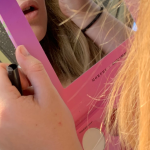By Rory Hawkins
It is Valentine’s Day, and I am alone.
My Tinder first date was postponed to later in the week; we don’t want to set too romantic a precedent. Besides, today I want to go see a movie, and we all should know by now that movies make awful first dates. It’s a stationary road trip, side by side, the sun beginning to rise – a bright world ahead with shadows behind, with a total stranger.
A movie is an awful first date, especially when it’s the three-hour-long journey of a Japanese stage actor grappling with the loss of his wife. But I’m not entirely alone. I invited a friend. Lachlan had nothing to do for Valentine’s too.
And I am desperate to see director Ryusuke Hamaguchi’s Drive My Car (2021), a film adaptation of Haruki Murakami’s short story of the same name. It’s a real custom job, converting another of Murakami’s, ‘Scheherazade,’ to expand on character, plot and themes. Both stories have been lifted from his 2017 (for English translation) short story collection, Men Without Women.
I look at Lachlan, at the vacant seats around me and him. Irony is never lost.
And neither are these stories’ narrative idiosyncrasies – we’ll dub “Murakami-isms” – in transport to the screen, even with all their additional mechanics. Still, as certifiably good as Drive My Car must be, taking home 2022’s Academy Award for International Film, how watchable is it for a general audience? While it’s a scenic journey for dedicated literary fans, is it for anyone else? So, with a nigh-empty theatre and three hours’ worth of awkward silences to explain to baffled Lachlan – and now you, in the backseat – we’ll pop the hood and see how it purrs.
***
Drive My Car follows Yusuke Kafuku (Hidetoshi Nishijima), an ageing stage actor specialising in multi-lingual performances, but you aren’t told this in any convenient way. Similar to a short story, there’s no introductory scene to formally present himself as the protagonist or deliver his backstory as a speech. Simply, he moves, and the camera follows. Like coarse Yusuke’s attitude to his new driver, Misaki Watari (Toko Miura), it is a film that asks you to keep both hands on the wheel and pay immediate attention. You aren’t told a lot and are shown just enough, not a quality for everyone to enjoy. Add in subtitles for Japanese, Korean, and Japanese-Korean Sign Language, and even a quick reader like Lachlan needed the occasional ‘remember, that’s a reference to when…’
But the film has a reputation for not being for everyone, which is obvious from the beginning.
Weird sex, that hallmark Murakami-ism.
Moreso, intimacy held askew with some instant feeling of imbalance or unease. Sunlight crowns the head, and darkly masks the face of Yusuke’s wife, Oto (Reika Kirishima), as she props herself up in bed. This first shot holds her silhouette close as she monologues, so close that she is speaking to you, not her husband, of her dream last night, the short story ‘Scheherazade.’
Cinematographer Hidetoshi Shinomiya may have taken inspiration from Lee Chang-Dong’s Burning (2018), another Murakami adaptation, by contrasting these super close-ups with shots of generous negative space, both lingering past comfortable welcomes. Pops of colour, like Yusuke’s brash cherry-red Saab 900 Turbo, are few and far between. Brightness comes only as the camera catches sunbeams, lens flares, blurs in motion, and the forms light takes and portrays. Drive My Car’s beginning evokes Burning’s “sunset dance” scene – its voyeurism, only knowing characters through stories they tell, left wondering who else they could be. Even without plot elements, ethereal moments like these stand out as delicately crafted for anyone to see.
Using another short story to complete Oto Kafuku’s part, and prologue the whole narrative, was an excellent choice. Though it takes half an hour before title cards even roll, it offsets Murakami’s habit to leave female characters by the side of the road. Repurposing ‘Scherezade’ does more respect to Oto with a richer backstory, a tangible relationship, and even more weird sex. As I said, there is a dry and ponderous plain to cross with reading Murakami, but with the screenplay, this switches gears to the hilariously awkward. My favourite example:
A jazz record mumbles in the background of the couple’s apartment.
Oto traces a hand on Yusuke’s desk. ‘What are you up to, honey?’
‘Nothing,’ he says.
He’s not doing nothing. He’s watching YouTube.
He’s watching YouTube videos about lamprey – a parasitic eel – because in orgasmic trance last night, straddled atop him on the sofa, on the anniversary of their daughter’s death, Oto told him the dream story of a teenage schoolgirl recounting, mid-masturbation herself, how in another life she had been a lamprey.
‘Actually, I-’ Yusuke frowns, and closes his laptop. ‘I have to get going.’
I looked to Lachlan – and he to me.
Then a few minutes later we found out that Oto was cheating.
When Yusuke’s overseas trip is cancelled, he taxis home to surprise Oto. He takes a quiet step into their apartment. He catches her in the hallway mirror, mounting a younger man on their sofa like that night not long before. And Yusuke leaves and spends the next week in the airport hotel, Skyping Oto about how great the theatre scene in Finland is.
Sometimes you just have to laugh and laugh we did. Just as well theatres are near-empty on Valentines. In all three hours, I don’t remember any moment of deliberate levity in Drive My Car. Hamaguchi makes no attempt at comedy with this film. It’s a rare thing to appreciate. Jokes can fall short or muddy the tone but, in this case, they’d simply halt the viewer from paving their own sense of humour over any number of earnest but eccentric scenarios. This might be obvious already, but I believe it’s your own sense of irony that will always work best to make something funny.
Still, Drive My Car has a confident tone, never steering off its course. In the space after Oto’s sudden death, Yusuke moves through his grief and the aftermath of the complex relationship he had with his wife. No matter where he goes, time in his little red Saab ekes by: time driving in silent understanding with Misaki; time confronted by his wife’s last affair, Koji (Masaki Okada) over who really knew her; time stagnant with Oto through the tape recordings she once handmade for him. Of course, we catch only the most poignant lines of Chekhov’s Uncle Vanya:
‘You understand that the world is not destroyed by villains and conflagrations,’ Oto recites, ‘but by hate and malice and all these petty squabbles.’ Her voice travels across years. She remains in their home, seated at the table. Sunlight crowns her head, and darkly masks her face. ‘It’s your duty to make peace, and not to growl at everything.’
‘Then help me first,’ recites Yusuke. ‘To make peace with myself.’
Rory Hawkins is a second year creative writing student who swears he enjoys writing fiction more, but good ideas keep getting bigger than the word count. Find more of his prose and poetry online with ScratchThat Magazine, read aloud with QUT Lit Salon, the fiction piece ‘Preloved’ in Glass, and through his Instagram @rory_writes_sometimes.








